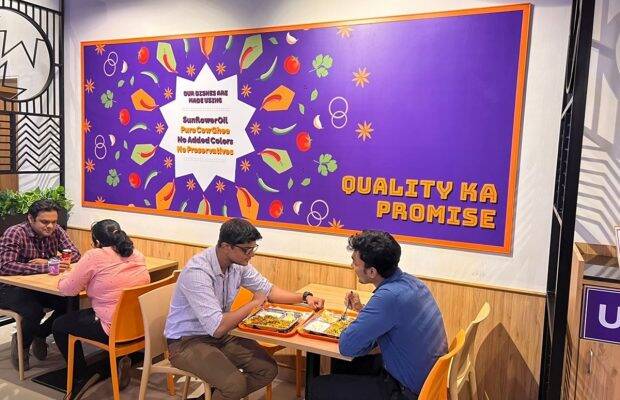Charcoal Concepts, which owns casual dining brand Copper Chimney, and restaurant and bar Bombay Brasserie, has forayed into the quick service restaurant (QSR) sector with Joshh and Joshh Kulfi (a desserts brand). The QSR model has been on an upward curve. An Edelweiss Securities report states that the Indian QSR market stood at Rs 34,800 crore in FY20. It is expected to reach Rs 82,763 crore by FY25, according to a Research and Markets report.
Fast, local
The first Joshh outlet — a pure vegetarian QSR — was launched in Powai, Mumbai, in November this year. Spread across an area of 2,500 sq ft, the new outlet also houses Joshh Kulfi. Charcoal Concepts plans to expand Joshh and Joshh Kulfi in four formats: full-service restaurants, which will comprise large outlets of 2,500 sq ft each, with the complete food menu, along with Joshh Kulfi; small independent Joshh Kulfi outlets; outlets in food courts of malls, around 500-600 sq ft in size; and dark kitchens.
The two QSRs aim to cater to young professionals and college-goers, says Karan Kapur, executive director, K Hospitality Corp, which owns Charcoal Concepts, and hence prices of food items are “affordable and competitive”. “Our starting price for a kulfi is Rs 59, which will go up to Rs 229 for a thali meal. We will also localise the menu. In Mumbai, for instance, we are offering Maharashtrian options like thalipeeth, kothimbir vadi, etc,” he adds.
Charcoal Concepts plans to launch 200 outlets of Joshh and Joshh Kulfi across the country in the next five years, and invest Rs 150 crore towards this. In the next two months, it will launch five outlets in Mumbai — two full-service restaurants, two food court outlets, and one dark kitchen. Cities such as Pune, Bengaluru, Chennai, Delhi, and Kolkata are next on the company’s radar. For delivery, the company has partnered with aggregators Swiggy and Zomato, and corporate catering service provider CaterHero. “We are also coming up with the Joshh app which will enable online ordering, and a click-and-collect facility,” Kapur says.
A good move?
Getting a toehold in the QSR sector could be difficult for Indian brands, experts say. “The Indian QSR segment is dominated by international chains. Homegrown brands have not managed to build scale as the industry is highly fragmented, consisting mainly of unorganised players,” says Ankur Bisen, senior partner and head (consumer, food and retail), Technopak Advisors.
Lately, QSR chains have had to adapt to the changing urban palate. As urban consumers move towards healthy and nutritious food options, changing their perception of QSRs and junk food could be a challenge, according to Anand Ramanathan, partner, Deloitte India.
On the bright side, as per Deloitte’s State of Consumer Tracker, 63% of Indian consumers feel safe about going to a restaurant, and intend to spend 8% of their discretionary income on restaurant/takeaway. “A strong demand is expected in the QSR segment owing to factors such as younger demographics, value-priced offerings, and the surge in online food ordering,” Ramanathan adds. That apart, what augurs well for QSR brands is their low set-up cost — 30-60% lower than that of a casual dining restaurant.
Engaging consumers on digital channels could prove beneficial for QSR brands to build scale. Analysts say tie-ups with food influencers and a solid social media promotion plan can help brands build significant buzz.
Metro cities, which cumulatively make up for a majority of the total revenue of the QSR industry, will continue to be an important market due to the presence of high-income consumers. However, the reverse migration brought about by the lockdowns, and increased digital penetration has caused a surge in demand from tier I and II towns as well, analysts note.
Read Also: One Life Studios inks exclusive streaming rights of Tennis Premier League 2021 with Sony LIV
Follow us on Twitter, Instagram, LinkedIn, Facebook

